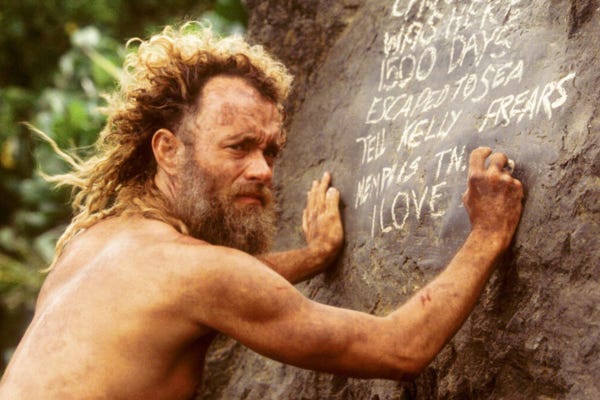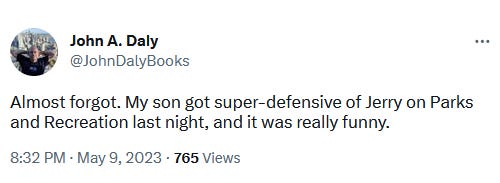First, I hope all of you moms had a great Mother’s Day. It’s a special day of recognition and appreciation, and I’m thankful that my own mother, who’s now in her mid-80s, is still in pretty good health. For the last four years, she and my father have lived just a ten-minute drive away from me, so I see her often. I’m also very thankful that my wife Sarah is such a great mother to our two kids.
Speaking of mothers, I recently interviewed author Mark Steven Porro for my publisher. Mark’s first book, a memoir called “A Cup of Tea on the Commode,” tells the heartwarming true story of how Mark gave up his carefree life in Los Angeles, and moved to New Jersey to help and bring joy to his elderly, ailing mother during her final years of life. The book was appropriately released yesterday, on Mother’s Day.
You can check out our interview (which I enjoyed very much) here:
Mark’s an interesting guy with a fascinating background. He was a Hollywood actor for 25 years, and landed his first role in 1986 on the critically-acclaimed television show, Hill Street Blues.
On a side note, Steven Bochco, the show’s creator, also created what is probably my all-time favorite television show — one that receives quite a few shout-outs in my Sean Coleman Thriller series: NYPD Blue.
Anyway, a tidbit I found particularly notable about Mark’s acting career was that he played the flight navigator in the hugely successful Tom Hanks film, Cast Away. Though his role in the film was quite small, Mark hinted in our conversation that the royalties he earned (and still earns) from it, despite his limited screen time, were and are quite significant.
Also significant, at least to me because I’m a film buff, was that while Mark’s role may have been small, his character would seem to have potentially been the most consequential individual in the entire movie. After all, if he was the flight navigator, and the plane went down due to extreme weather, wasn’t the crash kind of his fault? Wasn’t Tom Hanks stranded on that island for years — where he lost his wife-to-be, and was forced to perform self-dentistry and befriend a volleyball — because of Mark?
Mark denies he is to blame.
“I did not cause the crash,” he told me. “I tried to save the plane. It just didn’t work out.”
But is that true?
It’s safe to say that Mark’s at least half right. As is clear in the scene, everyone in the cockpit (including Mark) was frantically working to keep the plane in the air. But by then, things had gone so far south that the situation was hopeless (and Hanks certainly didn’t help matters by unbuckling himself and becoming a distraction for the flight crew).
But what led to such a dire, desperate predicament in the first place? By 1995, the year in which Cast Away begins, plane crashes were already extremely rare. Weather reports and radar had been doing an awfully good job of helping aviators avoid such calamities, so it would seem that human error would have had to be the culprit. In which case, which individual or individuals truly dropped the ball?
Well, I decided to take it upon myself to conduct a little investigation into this matter, in large part because a legitimate expert on the topic was up next on my interview docket.
Daniel V. Meier, Jr. is more than just an award-winning, cool-hat-wearing novelist. He also, for decades, served the FAA as an Aviation Safety Inspector for flight operations. Dan draws from that professional experience in his new novel, “Guidance to Death,” about an aviation accident investigator who’s trying to determine if a deadly company-jet crash was purposely caused.
After we discussed his book, I tapped into Dan’s expertise on the Cast Away matter, and he helped shed some light on the topic. Let’s see how Mark fared…
Dan began by questioning why the film’s captain didn’t fly around or over the radar-visible line of thunderstorms that ultimately took down the plane. “A jet airplane can usually climb over pretty much anything except maybe a Texas thunderstorm,” he explained.
I think Mark’s in the clear here, since he wasn’t the person flying the plane.
Dan also found it peculiar that the pilots were alarmed about losing communication, when that’s the normal situation when flying over an ocean. He also didn’t understand all the panic over one of the two engines going out, being that the plane everyone was in was built to fly on a single engine.
I’m not sure there was any cockpit negligence here — just people losing their cool, in the heat of the moment, over a couple of elements that shouldn’t have mattered a whole lot.
But here’s where things start looking bad for Mark…
“I think they got lost, or didn’t know their position, which is ridiculous,” Dan said of the flight crew. “Not with the on-board navigational equipment they had. You don’t lose your position, ever… You know where you all the time… To do that, you keep up with your calculations, and with your electronic equipment, all the time.”
According to Wikipedia, this is the job of a navigator:
The navigator's primary responsibility is to be aware of ship or aircraft position at all times. Responsibilities include planning the journey, advising the ship's captain or aircraft commander of estimated timing to destinations while en route, and ensuring hazards are avoided. The navigator is in charge of maintaining the aircraft or ship's nautical charts, nautical publications, and navigational equipment, and they generally have responsibility for meteorological equipment and communications.
So, let’s review…
As flight navigator, Mark’s job was to be aware of the aircraft’s position at all times (which he wasn’t), ensure hazards are avoided (which he didn’t), and have responsibility for meteorological equipment (which was seemingly ignored) and communications (which were out).
Folks, I’m pretty sure Mark crashed that plane.
I’d call for formal accountability on this matter, but since his character already paid with his life, it seems kind of pointless.
I’m just glad the truth is finally out there.
All silliness aside, congratulations to Mark Steven Porro and Dan Meier on their great new books. All of you should check them out.
Random Thought
Obligatory Dog Shot
Secret Service Squiggy.
Have you picked up your copy of RESTITUTION?
My latest book “Restitution: A Sean Coleman Thriller” is out now! You can get it on Amazon, Apple, Barnes & Noble, Kobo, Books-A-Million, and wherever else books are sold.
Interested in a signed copy? You can order one (or five) here.
Already read and enjoyed it? I’d love if you could leave a review for the book on Amazon.
Featured Vinyl
Something I learned fairly recently is that a lot of die-hard Queen fans don’t really like the Queen song, “Another One Bites the Dust.” I’m not sure why. I’ve always thought it (and that great bass riff) was great. It’s the reason I picked up the band’s “The Game” album from 1980, which, believe it or not, was their only record to ever reach number one on the U.S. charts.
That’s all for now. Thanks for reading today’s Daly Grind.
Want to drop me a line? You can email me at johndalybooks@hotmail.com, and also follow me on Facebook, Twitter, and Instagram. If you haven’t subscribed to this newsletter yet, please click on the “Subscribe now” button below. Doing so will get these posts emailed directly to you.
Also, if you’re not caught up on my Sean Coleman Thrillers, you can pick the entire series up at a great price on Amazon. And if you’re interested in signed, personalized copies of my books, you can order them directly from my website.
Take care. And I’ll talk to you soon!










I enjoyed this article, for the most part. But in my defense, you failed to mention that I replaced the original navigator, who, according to the evidence you and Dan reveal, is the one at fault. I came on board when the fate of the aircraft was already determined. I did my best, but one can only do so much.
On a side note, I wrote a comedy sequel to Castaway called “The Other Castaway.” In it, my character also survives the crash but is washed up on the other side of the island where most of the Christmas goodies on board also washed up: champagne, caviar, wine, Hickory Farms meats, hams, etc. And a large collection of Chia Pets that provided him an endless supply of vegetables. No volleyball or ice skates for him. Whenever Tom’s character searched the other side of the island, my greedy character and hid everything from him. Also, he made it off the island much sooner by tying together several Realdoll Sex dolls that, among the obvious benefits for a lonely castaway on a desert island, had amazing floatation properties. So, a happy ending. Pun intended. Many years ago, I shared this story with William Broyles Jr, the writer of Castaway, at the Austin Screenwriting Conference. He laughed. I then asked him not to steal it. So far, so good. But my sequel and again in my character’s defense, he too replaced the original navigator and therefore was also innocent of any negligence. I rest my case.
Good movie. Given 9/11 and recently, FLT MH370, we must add pilot insanity as a possible cause. (Like Wilson, Helen Hunt’s portrayal of abandonment is memorable, here.)